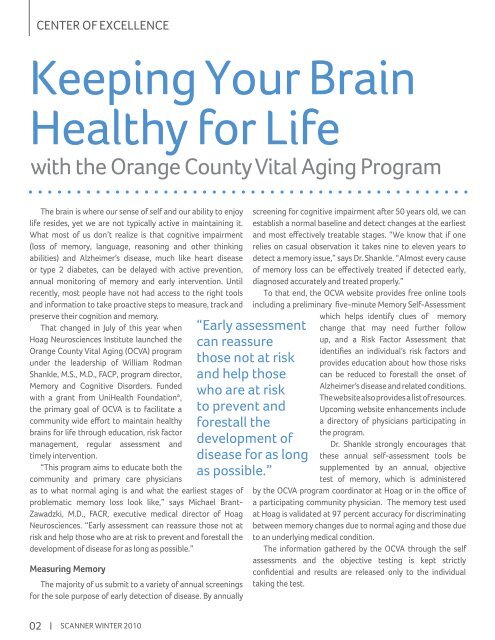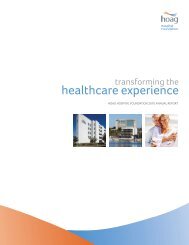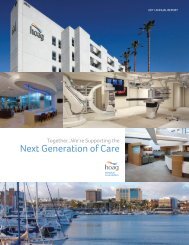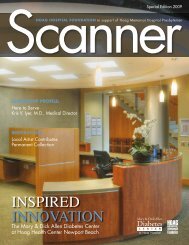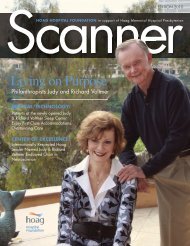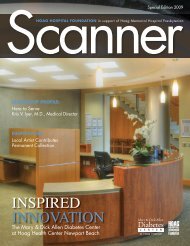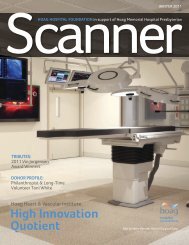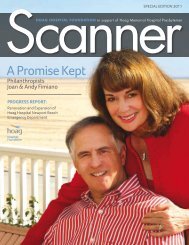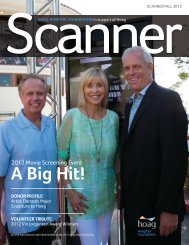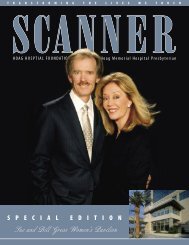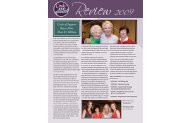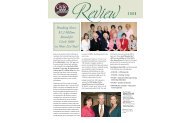keeping your brain healthy for life - the Hoag Hospital Foundation
keeping your brain healthy for life - the Hoag Hospital Foundation
keeping your brain healthy for life - the Hoag Hospital Foundation
Create successful ePaper yourself
Turn your PDF publications into a flip-book with our unique Google optimized e-Paper software.
CENTER OF EXCELLENCE<br />
Keeping Your Brain<br />
Healthy <strong>for</strong> Life<br />
with <strong>the</strong> Orange County Vital Aging Program<br />
The <strong>brain</strong> is where our sense of self and our ability to enjoy<br />
<strong>life</strong> resides, yet we are not typically active in maintaining it.<br />
What most of us don’t realize is that cognitive impairment<br />
(loss of memory, language, reasoning and o<strong>the</strong>r thinking<br />
abilities) and Alzheimer’s disease, much like heart disease<br />
or type 2 diabetes, can be delayed with active prevention,<br />
annual monitoring of memory and early intervention. Until<br />
recently, most people have not had access to <strong>the</strong> right tools<br />
and in<strong>for</strong>mation to take proactive steps to measure, track and<br />
preserve <strong>the</strong>ir cognition and memory.<br />
That changed in July of this year when<br />
<strong>Hoag</strong> Neurosciences Institute launched <strong>the</strong><br />
Orange County Vital Aging (OCVA) program<br />
under <strong>the</strong> leadership of William Rodman<br />
Shankle, M.S., M.D., FACP, program director,<br />
Memory and Cognitive Disorders. Funded<br />
with a grant from UniHealth <strong>Foundation</strong>*,<br />
<strong>the</strong> primary goal of OCVA is to facilitate a<br />
community wide ef<strong>for</strong>t to maintain <strong>healthy</strong><br />
<strong>brain</strong>s <strong>for</strong> <strong>life</strong> through education, risk factor<br />
management, regular assessment and<br />
timely intervention.<br />
“This program aims to educate both <strong>the</strong><br />
community and primary care physicians<br />
as to what normal aging is and what <strong>the</strong> earliest stages of<br />
problematic memory loss look like,” says Michael Brant-<br />
Zawadzki, M.D., FACR, executive medical director of <strong>Hoag</strong><br />
Neurosciences. “Early assessment can reassure those not at<br />
risk and help those who are at risk to prevent and <strong>for</strong>estall <strong>the</strong><br />
development of disease <strong>for</strong> as long as possible.”<br />
Measuring Memory<br />
The majority of us submit to a variety of annual screenings<br />
<strong>for</strong> <strong>the</strong> sole purpose of early detection of disease. By annually<br />
screening <strong>for</strong> cognitive impairment after 50 years old, we can<br />
establish a normal baseline and detect changes at <strong>the</strong> earliest<br />
and most effectively treatable stages. “We know that if one<br />
relies on casual observation it takes nine to eleven years to<br />
detect a memory issue,” says Dr. Shankle. “Almost every cause<br />
of memory loss can be effectively treated if detected early,<br />
diagnosed accurately and treated properly.”<br />
To that end, <strong>the</strong> OCVA website provides free online tools<br />
including a preliminary five-minute Memory Self-Assessment<br />
which helps identify clues of memory<br />
change that may need fur<strong>the</strong>r follow<br />
up, and a Risk Factor Assessment that<br />
identifies an individual’s risk factors and<br />
provides education about how those risks<br />
can be reduced to <strong>for</strong>estall <strong>the</strong> onset of<br />
Alzheimer’s disease and related conditions.<br />
The website also provides a list of resources.<br />
Upcoming website enhancements include<br />
a directory of physicians participating in<br />
<strong>the</strong> program.<br />
Dr. Shankle strongly encourages that<br />
<strong>the</strong>se annual self-assessment tools be<br />
supplemented by an annual, objective<br />
test of memory, which is administered<br />
by <strong>the</strong> OCVA program coordinator at <strong>Hoag</strong> or in <strong>the</strong> office of<br />
a participating community physician. The memory test used<br />
at <strong>Hoag</strong> is validated at 97 percent accuracy <strong>for</strong> discriminating<br />
between memory changes due to normal aging and those due<br />
to an underlying medical condition.<br />
The in<strong>for</strong>mation ga<strong>the</strong>red by <strong>the</strong> OCVA through <strong>the</strong> self<br />
assessments and <strong>the</strong> objective testing is kept strictly<br />
confidential and results are released only to <strong>the</strong> individual<br />
taking <strong>the</strong> test.<br />
“Early assessment<br />
can reassure<br />
those not at risk<br />
and help those<br />
who are at risk<br />
to prevent and<br />
<strong>for</strong>estall <strong>the</strong><br />
development of<br />
disease <strong>for</strong> as long<br />
as possible.”<br />
From Left to Right,<br />
Back Row: Dennis Fortier, William Rodman Shankle, M.D.,<br />
Michael Brant-Zawadzki, M.D., Cordula Dick-Muehlke, Ph.D.<br />
and Nicole Guillen Nguyen<br />
Front row: Junko Hara, Ph.D. and Dori Holnagel<br />
Leading <strong>the</strong> Way<br />
In <strong>the</strong> past, proactive <strong>brain</strong> maintenance has not received<br />
a lot of attention from <strong>the</strong> medical community when<br />
compared to preventive recommendations <strong>for</strong> o<strong>the</strong>r organs<br />
such as <strong>the</strong> heart. That is changing as evidenced by <strong>the</strong><br />
work of an international group of <strong>brain</strong> scientists, including<br />
Dr. Shankle, who came toge<strong>the</strong>r under <strong>the</strong> leadership of Dr.<br />
Zaven Khachaturian, <strong>for</strong>mer director of <strong>the</strong> National Institute<br />
of Aging Alzheimer’s Research Centers, to create a national<br />
roadmap to prevent Alzheimer’s disease by 2020 called <strong>the</strong><br />
Vital Aging program.<br />
<strong>Hoag</strong> Neurosciences Institute was one of <strong>the</strong> first<br />
organizations in <strong>the</strong> U.S. to be funded to implement a<br />
community based Vital Aging program. OCVA is <strong>the</strong> prototype<br />
of a community-based program that will add to <strong>the</strong> national<br />
body of knowledge.<br />
Prevent Alzheimer’s Endowment<br />
Support through <strong>the</strong> key inaugural grant from <strong>the</strong> UniHealth<br />
<strong>Foundation</strong> has allowed <strong>Hoag</strong> Neurosciences Institute to<br />
launch <strong>the</strong> program and fund it <strong>for</strong> <strong>the</strong> next three years. Drs.<br />
Brant-Zawadzki and Shankle are working to develop a Prevent<br />
Alzheimer’s Endowment to fund <strong>the</strong> program and research<br />
going <strong>for</strong>ward.<br />
“Although delaying and preventing dementia and<br />
Alzheimer’s disease will help reduce <strong>the</strong> massive financial<br />
burden <strong>the</strong>se disorders place on <strong>the</strong> health care system, a<br />
program like this is not reimbursed by traditional insurance,”<br />
says Dr. Brant-Zawadzki. “We are so grateful <strong>for</strong> <strong>the</strong> tremendous<br />
interest in and support of this program. Our continued success<br />
requires continued financial engagement and participation<br />
from our community.”<br />
If you would like to get involved in supporting this groundbreaking<br />
work, please contact Kenya Beckmann at 949-764-<br />
6384 or Kenya.Beckmann@hoag.org.<br />
* The OCVA is supported by a generous grant to <strong>Hoag</strong> Neurosciences Institute from<br />
UniHealth <strong>Foundation</strong>, a non-profit philanthropic organization whose mission is to<br />
support and facilitate activities that significantly improve <strong>the</strong> health and well-being<br />
of individuals and communities within its service area.<br />
Visit <strong>the</strong> Orange County Vital Aging Website at:<br />
ocvitalaging.org or call 949-764-6288<br />
<strong>for</strong> more in<strong>for</strong>mation or to schedule a free assessment.<br />
02 SCANNER WINTER 2010 SCANNER WINTER 2010 03


